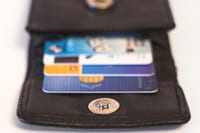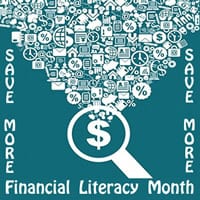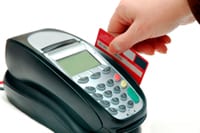 According to Lending Tree, consumer debt is up 7% over last year and has hit $1.27 trillion. Do you have credit card debt? If you carry a balance, call your credit card company and ask for a lower interest rate. Lending Tree also stated that 76% of people who asked we given a lower rate. #JillRussoFoster #FinancialLiteracyMonth
According to Lending Tree, consumer debt is up 7% over last year and has hit $1.27 trillion. Do you have credit card debt? If you carry a balance, call your credit card company and ask for a lower interest rate. Lending Tree also stated that 76% of people who asked we given a lower rate. #JillRussoFoster #FinancialLiteracyMonth
Protect Yourself

This weekend started off like any other weekend – running errands including a trip to the gas station. Everything seemed like a regular weekend. But here we are the next day and I go into my wallet and my ATM / debit card isn’t there.
First thing I do is to check my wallet, maybe I put in in another spot or maybe it’s loose in my purse. No such luck. Next, I go online to my bank account to see what transactions have posted, nothing that I didn’t recognize – that’s good. I immediately call my bank to ask them to freeze my card. This will give me a chance to look for it without any liability.
ATM / debit cards are different than credit cards when it comes to your liability. The most important thing to do is to contact your bank to stop your liability. If you contact your bank immediately before any unauthorized transactions occur, you have zero liability. The longer you wait, the more liability you have. Form more information, check out the Federal Trade Commission information page.
If I don’t find it today, I will call and cancel it and get a replacement card. Wish me luck in the search for my card.
Should you pay off your credit card debt with a mortgage refinance?
In our last Quick Tips, we talked about refinancing your mortgage. I hope you did your homework. If you decided that refinancing is right for you, you may be tempted to pay off your other debts by financing them into your mortgage.
Should you do it? Follow these steps to find out.
List all your debts
If debt is a problem for you, take a closer look. Make 5 columns:
Column 1: Write down the name of each creditor (credit card companies, auto dealership, bank, hospital, etc.)
Column 2: Write down why you took a loan or used a credit card. This will help you see how you came to be in debt. Were these essential expenses like a car or a hospital emergency? Or, were these items you could have saved for, like a vacation, clothes, or furniture.
Column 3. Write down the interest rate.
Column 4. Write down the current payment amount.
Column 5. Write down when it will be paid off at the current payment rate.
I know that this can be scary, but you need to know. Congratulate yourself for doing this. This is a huge step forward.
Why is it important to really look at your debt? If your debts just disappear into your mortgage, you could forget where they came from. Most people who consolidate their debt this way will have credit card debt again in just a few years.
Refinancing may not be the answer, but knowing how and why you spend will help you stay out of debt in the long run.
Consider the downside of consolidating your credit card debt into your mortgage. Credit card debt is unsecured, so you would be taking unsecured debt and betting your house on it. When you have credit card debt and can’t make payments, that’s a problem – but, your creditors cannot take your home. On the other hand, if you can’t make your mortgage payments, then you could lose your home in foreclosure. If you increased your mortgage loan in order to cover credit card debt, you could end up with a larger house payment – one that you can’t afford! That’s why I don’t recommend refinancing your unsecured debt into a mortgage.
Consider the long term outcome when refinancing secured debts into your mortgage.
Secured debt is a physical object that can be repossessed / foreclosed if you don’t pay: it could be a car, or even a home equity loan or line of credit. Here are three questions you should ask before making your decision:
1. If you combine your mortgage with your home equity will this mean you need to pay mortgage insurance? Mortgage insurance is added when the total amount of your mortgage is equal to, or over, 80% of your home’s appraised value. That will increase your monthly mortgage payment.
2. Will you need the home equity line in the future? It will be difficult to get a new line in these economic times.
3. Is it better to pay off your debts yourself, and have a tight budget for the short term? Or combine them with your refinance and have a bigger mortgage in the long term?
Think long and hard about what you put into your new mortgage. Consult with your tax preparer for an objective opinion.
Credit Card To The Rescue
 For several years, we were planning this big vacation for this year. We would be visiting several European countries over the course of three weeks. Lots of time and efforts was put into the planning and coordinating with friends we would be seeing along the way. Enter 2020 and the pandemic, and we cancelled everything.
For several years, we were planning this big vacation for this year. We would be visiting several European countries over the course of three weeks. Lots of time and efforts was put into the planning and coordinating with friends we would be seeing along the way. Enter 2020 and the pandemic, and we cancelled everything.
That left us with many refunds / credits to pursue. The airlines tickets were amazingly easy, we cancelled, and miles were returned to our account within days. We have a credit for future travel – easy. Hotels were all booked without a deposit – so that made cancellations easy. Excursions were fairly easy to cancel, although we have credits for one to use in the near future (I hope).
Now on to the hard part. We chose to cancel our cruise before the cruise line cancelled the cruise. We did it before final payment, as we did not want to have our money tied up. Now, we needed to get back our deposit plus some extra charges. We cancelled our cruise more than 90 days in advance, so all was refundable. We understood that refunds were taking quite a while and were patient. The credits started to come in and various amounts. No amount refunded was equal to the charges. So, we totaled up what was owed and started to subtract the refunds, but not all the money was returned. (Thanks to meticulous record keeping, we knew what was owed to us and how it was paid for).
Why is this important? Because when all was done, we were not made whole. We were shorted some of our money paid. We ended up filing a dispute with our credit card company. When you use a credit card for payment you have the added benefit for protection. We were able to provide all the details, original charge information and all the calls / emails to rectify the situation. This is important for your dispute case. Then just this past week, the dispute was resolved by our credit card company and we are all set, and we were made whole.
When you find yourself at your wits end and frustrated, know that your credit card company can help you resolve the situation. Remember this only works if you use a credit card for payment.
Understanding How Credit Works In Your Life
Let’s talk about credit.
First, loans / credit cards are when you use someone’s else’s money (borrowing). You are receiving goods or services now that you have agreed to pay for later (either in full or with a series of payments). This will help you to establish or re-establish your credit. This is different from a debit card, which is using your own money and not building your credit.
Now that we have that straight, credit is an extremely important part of your finances. It gives you that ability to purchase goods or services when you need it and pay for it later. Sometimes life requires you to make a purchase now (even when you don’t have the funds of your own to do it now). Last month, I came home from work to find our smoke and carbon monoxide detectors beeping – not a good thing. It wasn’t the batteries, which meant it had been 10 years since we replaced them. Ugh! There was an immediate need to have the electrician come and replace all 11 smokes and carbon monoxide detectors now. It wasn’t something we planned on in our July budget, but it needed to be done now. That’s where credit comes in. They were replaced and we will pay the bill in August.
Credit is something you will find you need in your life, whether it be for emergencies or planned purchases. Having good credit will be an asset to you in your time of need. Having good credit will give you more favorable terms (lower interest rate) for your repayment terms. The higher your credit, score the better chances of getting credit at the best terms. Putting it a different way, your credit score is as important to your finances as your GPA is to getting into college – both numbers are an important in your life.
To have the best credit, you need to use it but not abuse it. It’s easier said than done. You need to use your credit and make purchases as needed, but only purchase what you can afford. You need to make your payments on time and not max out your debt.
In my next newsletter, I’ll talk about credit and some frequently asked questions.
Financial Literacy Month – Tip #13
Monitor Your Accounts
Here’s the tip from July 28-Credit month:
Something that I personally do weekly is to monitor my accounts. I go online (from my home computer) and check my accounts, both bank and credit cards. I actually look at the individual transactions to see what is posted. Is there anything that I don’t recognize? Get in the habit of this and check even if you haven’t used the account. You never know who has.
To purchase a copy of either of my books Thrive In Five: Take Charge of Your Finances in 5 Minutes a Day or 111 Ways To Save
#JillRussoFoster #30WaysToSave
Reducing Your Interest And/Or Fees
Last, we spoke about bank accounts – now I’ll talk about credit cards.
Do your homework and determine what credit cards your have, what interest rate and fees your paying.
First, you must be honest with yourself and decide which of these two categories you fall into:
- Credit card balances are paid in full each and every month
- You pay your credit card monthly, but carry a balance month to month
Which one are you?
If you are number #1, you are not concerned about the interest rate associated with your credit card. You pay the balance in full each and every month, so there isn’t interest charged to you. You need to look at the fees that you might incur.
If you are a number #2, you care about the interest rate and the lower the interest rate is, the less you pay each and every month while you are carrying a balance.
Are you using the right credit card for the spender you are? If not, look around to determine if there is a better option for you.
Make Your Money Grow
Do you have the best bank / credit union accounts? How can you tell which is best for you?

For your bank / credit union account, you want to earn the highest interest rate (paid to you) with no (or the lowest) fees. Start by looking at what you currently have – how much are you earning and paying? Once you know this information, you have a starting point. Now compare that with what other’s offer. Can you do better? Don’t forget while looking compare both local, out of state and virtual banks / credit unions. What would you have to do to eliminate all fees?
Keep in mind, that the bank and/or credit union you are looking at must (non negotiable) be FDIC (Federal Deposit Insurance Corp.) for a bank or savings and loan. Credit Unions are insurance through NCUA (National Credit Union Administration). This protects your money up to $250,000. Once you confirm this, then look at how you earn interest and what fees are involved before making your choice.
Personally, we bank both locally and virtually. We earn interest on both our checking and savings accounts with no fees and do NOT have to carry a large balance in the account to do this. So if we can do this, you can too.
Other quick tips, that may help you:
- Don’t link your savings account to your ATM / Debit card
- Set up automatic savings deposits with each and every paycheck (pay yourself first).
Remember, that every penny your earn or save is more money in your pocket. Those pennies add up.
Are You In Credit Card Debt?
Are you one of the increasing many who rely on credit cards to live?
Since the financial crisis, we have seen consumer debt decline. That’s a good thing. But not anymore. Credit cards debt has now hit the $1 trillion mark according to the Federal Reserve. To read more, click here
For more tips, visit my website.
Fees, fees and more fees!
How many credit cards do you have that charge a fee?
Do you pay:
annual fee?
foreign transaction fee?
balance transfer?
cash advance?
and more
We’ll you are not alone. There are so many credit card to choose from, that you can avoid these fees by having the right credit card for this situation. We have a card that we use for foreign travel – no fee. We have a low interest card 8% with no fees for when we need to finance a purchase (that we know we won’t be able to pay off in full when the bill arrives). So it’s understanding what your needs are and what credit card meets them.
CreditCards.com released a report listing what credit cards offer what. This will help you to decide if you have the correct credit card for your needs and may help you to save money.
- 1
- 2
- 3
- 4
- Next Page »